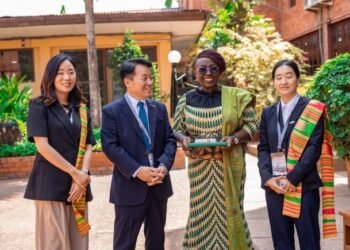In recent years, the landscape of music in Ghana has witnessed a significant transformation, with the formation of musical groups gaining unprecedented popularity. This trend is driven by cultural, social, and economic factors that have made collaboration among artists more appealing.
From traditional ensembles to contemporary bands and vocal groups, the evolution of musical collectives reflects the rich tapestry of Ghanaian culture and the dynamic nature of its music industry.
Ghana has a rich musical heritage that spans various genres, including highlife, hiplife, gospel, and traditional music. These genres often emphasize community and collaboration, making forming musical groups a natural extension of Ghanaian cultural practices.
RelatedPosts
Traditional music has long relied on groups for performances, with drumming ensembles and vocal choruses playing vital roles in communal gatherings and celebrations. As modern genres have emerged, the collaborative spirit has persisted, with artists recognizing the value of pooling their talents.
Ghanaian music trio, No Nation Gang, has asserted that musical groups have become more appealing in recent years, citing the global success of some Ghanaian groups.
The No Nation Gang, comprised of Second Paa, Zubu, and Badone Sticky, is one of the country’s fast-rising music groups, making waves with their unique sound.
According to Zubu, the group’s lead rapper noted that the rise of groups like Asakaa rekindled interest in group music, making it more attractive to upcoming musicians.
“Musical groups, I would say, have been one of the backbones of Ghanaian music. Despite the challenges faced over the years, I believe the trend is beginning to come back.”
Zubu
Second Paa, the lead singer, echoed these sentiments, saying, “It is gradually becoming an attractive venture for upcoming musicians who unite their talents to produce something unique and appealing to the international music market.”
Badone Sticky, the versatile member of the group, supported his colleagues’ views, adding that musical groups represent the future of Ghanaian music.
He urged stakeholders to support music groups and encouraged fans to show their backing, as this would motivate musicians to excel and push Ghanaian music to new heights.
The economic landscape of the Ghanaian music industry has also shifted, making the formation of musical groups more appealing. The rise of digital platforms has democratized music distribution, allowing artists to reach wider audiences without the need for traditional record labels.

By forming musical groups, artists share the financial burden of production, marketing, and touring. Collaborations often lead to joint albums, which generate more revenue than solo projects.
Additionally, group dynamics create opportunities for sponsorships and endorsements, as brands are often more inclined to partner with collectives that present a unified front.
Social Media and Connectivity
The advent of social media has revolutionized how artists connect and collaborate. Platforms like Instagram, TikTok, and YouTube allow musicians to showcase their talents, connect with fans, and discover potential collaborators.
In Ghana, social media has played a crucial role in the popularity of musical groups. Viral challenges and trends often encourage artists to collaborate, leading to the formation of new groups. For example, the “Shatta Movement” and “Bhim Nation” are not just fan bases but also represent collective identities for their respective artists, fostering collaboration among members.
Moreover, the fusion of genres has become a global phenomenon, with artists from different cultural backgrounds collaborating to create unique sounds. Ghanaian musicians are increasingly experimenting with genres like Afrobeat, reggae, and hip-hop, often forming groups that bring together diverse influences.
While the formation of musical groups in Ghana presents numerous opportunities, it is not without challenges. Creative differences, financial disputes, and the struggle for individual recognition lead to tensions within groups. Successful collaborations require effective communication, compromise, and a shared vision among members.
The appeal of forming musical groups in Ghana is a reflection of the country’s rich cultural heritage, the evolving economic landscape, and the influence of global trends. As artists continue to collaborate and innovate, the Ghanaian music scene is poised for further growth and diversification.
The rise of musical groups not only enriches the cultural fabric of the nation but also positions Ghana as a significant player in the global music industry.
READ ALSO: Police Responds to Alleged Unlawful Demonstration by Democracy Hub























